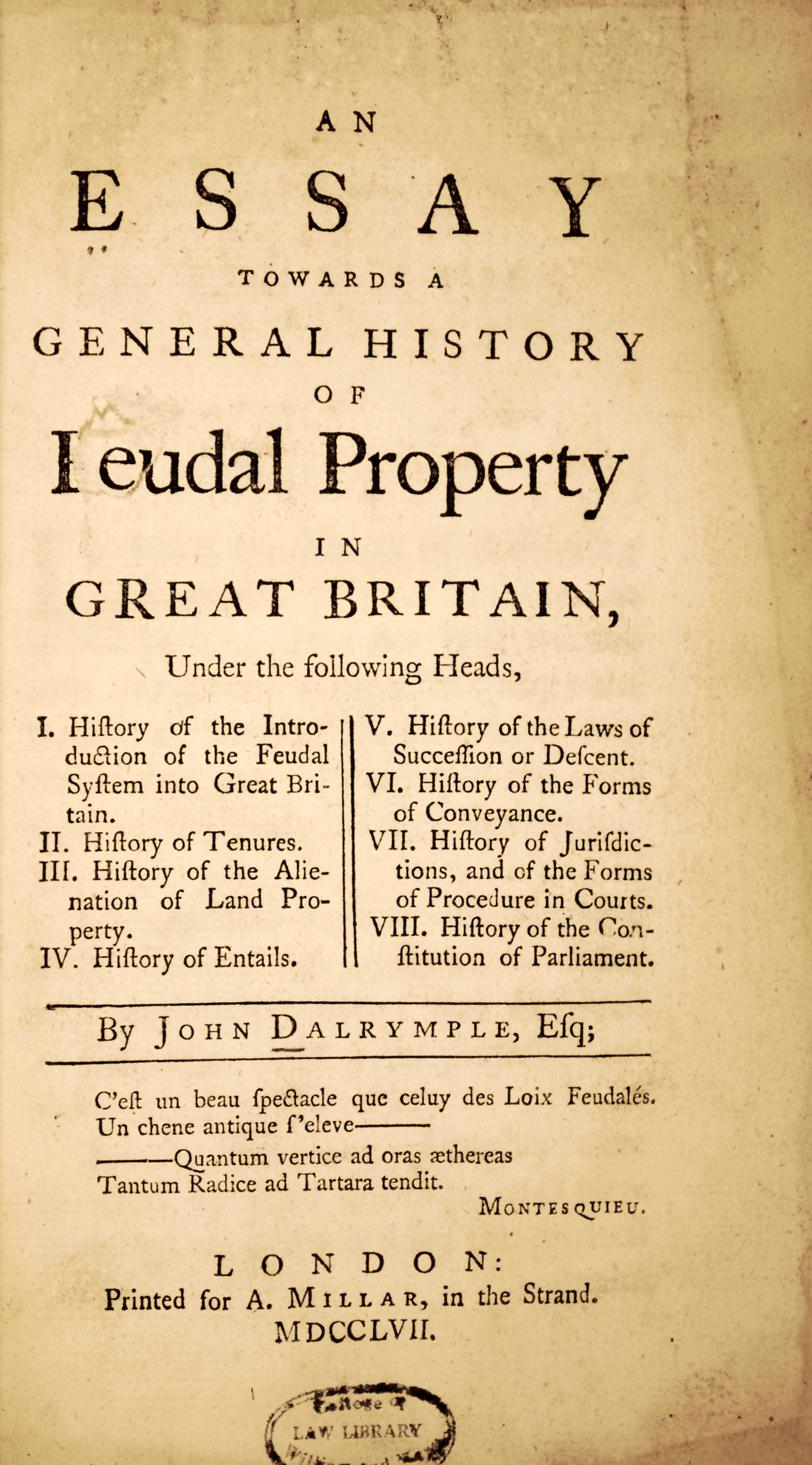An Essay Towards a General History of Feudal Property in Great Britain
by Sir John Dalrymple
| An Essay Towards a General History of Feudal Property in Great Britain | |
|
Title page from An Essay Towards a General History of Feudal Property in Great Britain, George Wythe Collection, Wolf Law Library, College of William & Mary. | |
| Author | Sir John Dalrymple |
| Published | London: Printed for A. Millar |
| Date | 1757 |
| Edition | first |
| Language | English |
| Pages | vii, 332 |
| Desc. | 8vo (21 cm.) |
| Location | Shelf F-4 |
Sir John Dalrymple (1726 – 1810), the fourth baronet in the family, received his education at Edinburgh University and Trinity Hall, Cambridge.[1] In 1748 he was admitted to the Faculty of Advocates. Dalrymple was elected as solicitor to the board of excise as well as depute lord advocate, moved up to the bench of the court of exchequer, and participated as a member of Edinburgh literati and other prominent societies such as the Select Society and the Glasgow Literary Society. As a lawyer and writer, Dalrymple was concerned with furthering the study of law both in a philosophical and historical sense. His Essay towards a General History of Feudal Property in Great Britain was posthumously dedicated to Montesquieu.
Evidence for Inclusion in Wythe's Library
Goodwin's pamphlet,[2] Dean's Memo[3], and Brown's Bibliography[4] all include Essay towards a General History of Feudal Property in Great Britain. Dean and Goodwin relied upon on a reference in William Edwin Hemphill's dissertation on Wythe, "George Wythe the Colonial Briton." In discussing Thomas Jefferson's commonplace book, Hemphill states "The succeeding section of the book, written between 1774 and 1777, was based ... upon more philosophical materials, including Sir John Dalrymple's Essay Towards a General History of Feudal Property in Great Britain."[5] Brown cites Hemphill but also refers to Jefferson's commonplace book itself.[6] Jefferson studied law under Wythe from 1762 to 1767, so the entries from the mid 1770s may not reflect Wythe's influence. Nevertheless, Dean lists the 1757 edition as mentioned by Hemphill. Goodwin and Brown note the third (1758) edition which Jefferson sold to the Library of Congress.[7] The Wolf Law Library followed Dean's recommendation and purchased the 1757 edition.
Description of the Wolf Law Library's copy
Rebound in period style full calf with gilt-ruled spine and red label.
Images of the library's copy of this book are available on Flickr. View the record for this book in William & Mary's online catalog.
Full text
See also
References
- ↑ Nicolas Phillipson, "Dalrymple, Sir John, of Cousland, fourth baronet (1726–1810)" in Oxford Dictionary of National Biography (Oxford University Press, 2004- ), accessed October 4, 2013.
- ↑ Mary R. M. Goodwin, The George Wythe House: Its Furniture and Furnishings (Williamsburg, Virginia: Colonial Williamsburg Foundation Library, 1958), XLVII.
- ↑ Memorandum from Barbara C. Dean, Colonial Williamsburg Found., to Mrs. Stiverson, Colonial Williamsburg Found. (June 16, 1975), 10 (on file at Wolf Law Library, College of William & Mary).
- ↑ Bennie Brown, "The Library of George Wythe of Williamsburg and Richmond," (unpublished manuscript, May, 2012) Microsoft Word file. Earlier edition available at: https://digitalarchive.wm.edu/handle/10288/13433.
- ↑ William Edwin Hemphill, " George Wythe the Colonial Briton: A Biographical Study of the Pre-Revolutionary Era in Virginia" (PhD diss., University of Virginia, 1937), 127.
- ↑ The Commonplace Book of Thomas Jefferson: A Repertory of His Ideas on Government, ed. Gilbert Chinard (Baltimore, MD: The Johns Hopkins Press, 1926), 135-136.
- ↑ E. Millicent Sowerby, Catalogue of the Library of Thomas Jefferson, (Washington, D.C.: The Library of Congress, 1952-1959), 2:317-318 [no.2005].
External Links
Read this book in Google Books.
